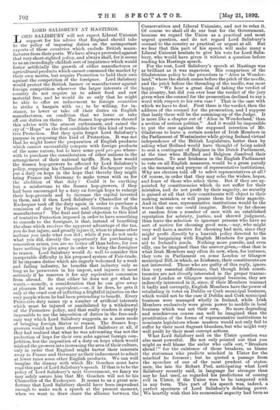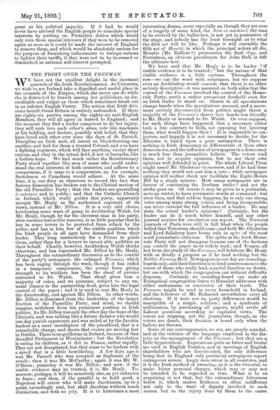LORD SALISBURY AT HASTINGS. L ORD SALISBURY will not expect Liberal
Unionist support for his advice that England should take to the policy of imposing duties on the unimportant exports of those countries which exclude British manu- factures from their ports. We have always protested against that very short-sighted policy, and always shall, for it seems to us an exceedingly childish sort of impatience which would foster artificially the growth of either manufactures or agricultural products which cannot command the market by their own merits, but require Protection to hold their own against the competition of the foreigner. Lord Salisbury would protect the British farmer or manufacturer against foreign competition wherever the larger interests of the country do not require us to admit food and raw material free, and he would do so only that he might be able to offer an inducement to foreign countries to strike a bargain with us ; to be willing, for in- stance, to lower or take off their duties on English manufactures, on condition that we lower or take off our duties on theirs. The Sussex hop-growers cheered this advice with the utmost enthusiasm, and raised the cry of " Hops " as the first candidate for this kind of tenta- tive Protection. But they quite forgot Lord Salisbury's purpose in proposing this kind of Protection. It was not that he might foster the preparation of English products which cannot successfully compete with foreign products of the same nature, but to have some quid pro quo where- with to purchase the consideration of other nations in the arrangement of their national tariffs. Now, how would the Sussex hop-growers be affected by Lord Salisbury's policy, supposing his Chancellor of the Exchequer really put a duty on hops in the hope that thereby they might bring France and Germany to make terms with us for the abolition of that duty ? Could it be anything but a misfortune to the Sussex hop-growers, if they had been encouraged by a duty on foreign hops to enlarge their hop-grounds and to increase the capital invested in them, and if then Lord Salisbury's Chancellor of the Exchequer took off the duty again in order to purchase a remission of duty by France and Germany on English manufactures ? The final and fatal objection to this kind of tentative Protection imposed in order to have something to concede to the foreigner, is that, instead of benefiting the class which receives the apparent advantage of the tax, you do but injure, and greatly injure it, when to please other nations you undo what you did ; while if you do not undo what you did, directly the opportunity for purchasing a concession arises, you are no better off than before, for you have nothing to give away in order to bring the foreigner to reason. Lord Salisbury would do well to consider this insuperable difficulty in his proposed system of Fair-trade. If he imposes duties which are eagerly welcomed by a weak and failing industry, he benefits that industry only so long as he perseveres in his impost, and injures it most seriously if he removes it for any equivalent concession from abroad. So that either he does not get what he wants,—namely, a consideration that he can give away at pleasure for an equivalent—or, if he does, he gets it only at the cruel cost of inflicting a frightful injustice on the very people whom he had been pretending to benefit. Every Protective duty raises up a number of artificial interests which must be injured or annihilated by a withdrawal of the Protective policy, and that really renders it simply impossible to use the imposition of duties in the free-and- easy way which Lord Salisbury suggests, as a mere mode of bringing foreign States to reason. The Sussex hop. growers would not have cheered Lord Salisbury at all, if they had realised that what he was advocating was not the protection of hops for their own sake against foreign com- petition, but the imposition of a duty on hops which would mislead the growers into increasing the area of their culture, only in order that England might barter their interests away to France and Germany as their inducement to admit at lower rates some other English products. We can well imagine the dismay with which Mr. Goschen must have read this part of Lord Salisbury's speech. If that is to be the policy of Lord Salisbury's next Government, we fancy we may safely assure him that Mr. Goschen will not be his Chancellor of the Exchequer. It seems to us a great mis- fortune that Lord Salisbury should have been imprudent enough to make such a speech at the present moment, when we want to draw closer the alliance between the Conservatives and Liberal Unionists, and not to relax it. Of course we shall all do our best for the Government, because we regard the Union as a practical and most urgent question, and do not regard Lord Salisbury's counsel to the country as practical or urgent at all. But we fear that this part of his speech will make many a Liberal Unionist hesitate to give his vote for Lord Salis- bury, who would have given it without a question before reading his Hastings speech.
For the rest, Lord Salisbury's speech at Hastings was as brilliant as it was sagacious. His comparison of the Gladstonian policy to the procedure in "Alice in Wonder- land," where the shriek comes before the prick of the needle, and the prick before the threading of the needle, was most happy. "We hear a great deal of taking the verdict of the country, but did you ever hear the verdict of the jury given when the counsel for the prosecution declined to say a word with respect to his own ease? That is the case with which we have to deal. First there is the verdict, then the address of the counsel for the prosecution, and I suppose that lastly there will be the summing-up of the Judge. It is more like a chapter out of Alice in Wonderland,' than a section of serious politics." And it would be impossible to put the case against the supposed intention of Mr. Gladstone to leave a certain number of Irish Members in the Parliament of Westminster while giving Ireland virtual independence of the British Legislature, better than by asking what Holland would have thought of being asked to seat a contingent of Belgians in the Dutch Parliament, at the time when Holland and Belgium dissolved their connection. To seat Irishmen in the English Parliament to vote on all English measures, would be a gross parody on the meaning and purpose of representative institutions. Why are electors told off to select representatives at all ? Of course, in order that they may echo the wishes, hopes, and fears of those who select them. But if they are ap- pointed by constituencies which do not suffer for their mistakes, and do not profit by their sagacity, no security is gained at all that their constituents will object to their making mistakes, or will praise them for their sagacity. And in that case, representative institutions would be the worst that any one could imagine. Better by far choose at random from a number of men with an established reputation for sobriety, justice, and shrewd judgment, than leave the selection to ignorant persons who have no sort of motive for choosing good men,—nay, who might very well have a motive for choosing bad men, since they might profit directly by a knavish policy directed to the end of bargaining with English Members for grants in aid to Ireland's needs. Nothing more puerile, and even silly, can be imagined than the answer given,—that that is what Irish Members may often do now, when, for instance, they vote in Parliament on some London or Glasgow municipal Bill, in which, as Irishmen, their constituents are not interested. Those who are guilty of this reply, ignore this very essential difference, that though Irish consti- tuencies are not directly interested in the proper transac- tion of London or Glasgow municipal business, they are indirectly interested in it, since, if their Members transact it badly and corruptly, English Members have the power of retaliating in votes on Dublin or Cork municipal business, which would not be the case if Dublin and Cork municipal business were managed wholly in Ireland, while Irish Members exclusively were given power to meddle in local business which was not their own. No more degrading and mischievous course can well be imagined than the prostitution of the forms of representative institutions to nominate legislators whose masters would not only fail to suffer by their most flagrant blunders, but who might very well profit by their most corrupt actions.
What Lord Salisbury said on the Ulster question was also most powerful. He not only pointed out that you might as well blame the sailor who calls out, "Breakers ahead !" for the existence of those breakers, as blame the statesman who predicts mischief in Ulster for the mischief he foresees ; but he quoted a passage from the speeches of one of the most prudent of states- men, the late Sir Robert Peel, anticipating what Lord Salisbury recently said, in language far stronger than any he had used, as regarded his predictions of coming evil in Ulster, if the Union were to be tampered with in any form. This part of his speech was, indeed, a perfect specimen of Lord Salisbury's debating power. We heartily wish that his economical sagacity had been as great as his political sagacity. If it had, he would never have advised the English people to stimulate special interests by putting on Protective duties which would only ruin those special interests if they were to be removed again as soon as it could be made the interest of England to remove them, and which would be absolutely useless for the purpose of furnishing inducements to foreign nations to lighten their tariffs, if they were not to be increased or diminished as national self-interest prompted.



































 Previous page
Previous page